Hello!
Welcome to the latest edition of Books on GIF, the fun and smart alternative to boring book reviews. This Sunday's book is 'BUtterfield 8' by John O'Hara.
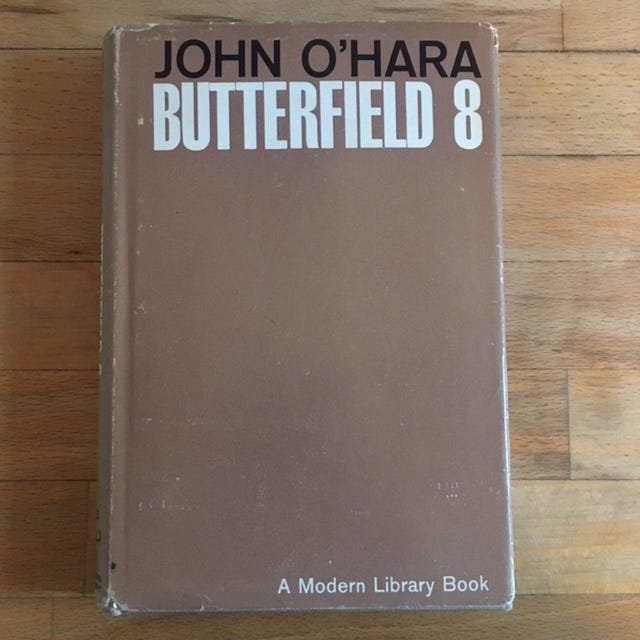 That’s not a typo. The book, which I bought at the wonderful Brattle Book Shop in Boston, takes its title from a 1930's-style New York City telephone number. (There's a short explanation on the title page.) The Brattle sells used books, and when I saw this 1961 Modern Library edition, I snagged it right away. For one thing, I really dig O'Hara's work for the beautiful way he tells bleak stories about infidelity, alcoholism and death. I also love the Modern Library imprint. Their books are just so well made. Although this edition is more than 50 years old, the pages have barely yellowed, the font is clear and readable, and the cloth-bound cover shows little sign of wear. Whoever owned it before me (who got it as a gift, as indicated by the diagonal cut on the inside flap) kept it on a shelf forever because while the dust jacket's spine has faded, its front and back look almost brand new. OK, enough about the book, let's talk about the book. The protagonist is Gloria Wandrous, whose story begins when she wakes up alone in a married man's apartment. Elizabeth Taylor won an Oscar for portraying Gloria in the 1960 film adaptation, which I'll see on Turner Classic Movies later this month. Here she is:
That’s not a typo. The book, which I bought at the wonderful Brattle Book Shop in Boston, takes its title from a 1930's-style New York City telephone number. (There's a short explanation on the title page.) The Brattle sells used books, and when I saw this 1961 Modern Library edition, I snagged it right away. For one thing, I really dig O'Hara's work for the beautiful way he tells bleak stories about infidelity, alcoholism and death. I also love the Modern Library imprint. Their books are just so well made. Although this edition is more than 50 years old, the pages have barely yellowed, the font is clear and readable, and the cloth-bound cover shows little sign of wear. Whoever owned it before me (who got it as a gift, as indicated by the diagonal cut on the inside flap) kept it on a shelf forever because while the dust jacket's spine has faded, its front and back look almost brand new. OK, enough about the book, let's talk about the book. The protagonist is Gloria Wandrous, whose story begins when she wakes up alone in a married man's apartment. Elizabeth Taylor won an Oscar for portraying Gloria in the 1960 film adaptation, which I'll see on Turner Classic Movies later this month. Here she is:
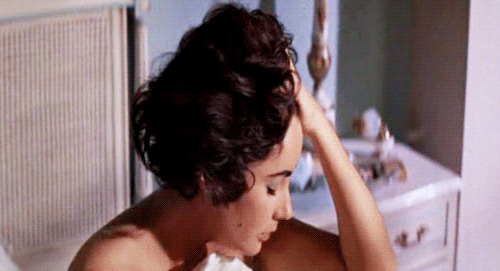 She awakens with crippling despair, brought on by a hangover and a deeper trauma we learn about later. She pleasures herself to cheer up before getting out of bed to wander the empty apartment. She spies an envelope on a table, opens it, and finds money with a note from her lover, a Don Draper-like character named Liggett, apologizing for ripping her dress the night before. The money is meant to replace the torn garment, but since Gloria has on only her underwear, she goes into Liggett's wife's closet and takes a mink coat. She then leaves, and enters Depression-era New York, full of speakeasies, hard drinking and sex. In the movie version, which I have not yet seen, Gloria is a prostitute, while in the book she is not. The film also plays up Taylor's sex appeal, but Book Gloria is not a sex object. I never thought of her like:
She awakens with crippling despair, brought on by a hangover and a deeper trauma we learn about later. She pleasures herself to cheer up before getting out of bed to wander the empty apartment. She spies an envelope on a table, opens it, and finds money with a note from her lover, a Don Draper-like character named Liggett, apologizing for ripping her dress the night before. The money is meant to replace the torn garment, but since Gloria has on only her underwear, she goes into Liggett's wife's closet and takes a mink coat. She then leaves, and enters Depression-era New York, full of speakeasies, hard drinking and sex. In the movie version, which I have not yet seen, Gloria is a prostitute, while in the book she is not. The film also plays up Taylor's sex appeal, but Book Gloria is not a sex object. I never thought of her like:
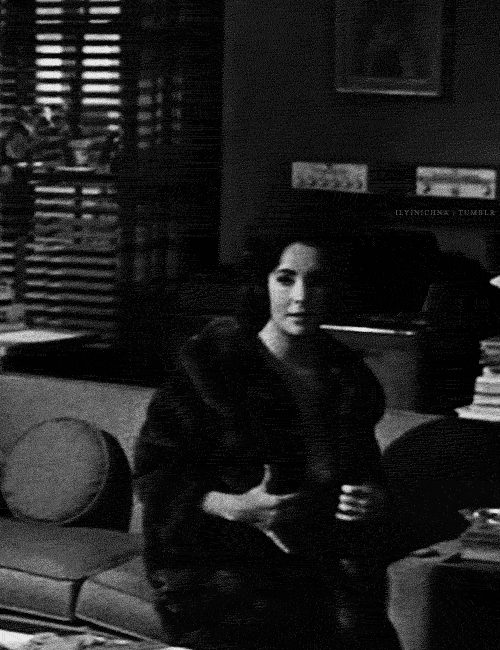 Sex and liquor drive Gloria not because it's her job, and not to titillate the reader, but because she hopes that the pleasures of the bottle and the bedroom will heal the inner pain, shame and despair she feels when sober. She's a complicated and conflicted character, and making Movie Gloria a call girl undermines her sexual agency and indulges the trope that the only woman in control of her sex life is a prostitute. If I could travel back in time and speak to the screenwriters, I'd be like:
Sex and liquor drive Gloria not because it's her job, and not to titillate the reader, but because she hopes that the pleasures of the bottle and the bedroom will heal the inner pain, shame and despair she feels when sober. She's a complicated and conflicted character, and making Movie Gloria a call girl undermines her sexual agency and indulges the trope that the only woman in control of her sex life is a prostitute. If I could travel back in time and speak to the screenwriters, I'd be like:
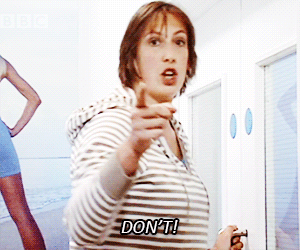 There isn't much plot in the book beyond Gloria grappling with who she's more in love with, Liggett or her platonic friend, Eddie. She thinks she loves Liggett because he's dashing, wealthy and can take care of her. But he's married. Or maybe she loves Eddie, who isn't too judgey about her lifestyle and respects her as a person. But she knows the moment she sleeps with him, he will become like every other man in her life, and the thing that was special about him will be lost. She's so lonely. I felt bad for her. And I rooted for her until it was revealed she is an awful racist. In fact, there is a number of racial slurs in this book. Even though one character calls out another about it, the racism took me out of the story, and I was like:
There isn't much plot in the book beyond Gloria grappling with who she's more in love with, Liggett or her platonic friend, Eddie. She thinks she loves Liggett because he's dashing, wealthy and can take care of her. But he's married. Or maybe she loves Eddie, who isn't too judgey about her lifestyle and respects her as a person. But she knows the moment she sleeps with him, he will become like every other man in her life, and the thing that was special about him will be lost. She's so lonely. I felt bad for her. And I rooted for her until it was revealed she is an awful racist. In fact, there is a number of racial slurs in this book. Even though one character calls out another about it, the racism took me out of the story, and I was like:
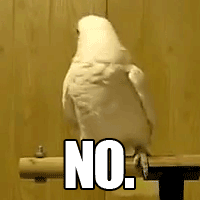
Still, there is a lot I like here. I love O'Hara's critique of social mores that offer only two life paths to women: marriage or death. I love its sober take on sex and homosexuality as nothing to get warped about. And I love its depiction of 1930s New York, where Tuesday night dinner is black tie, and every speakeasy serves steak. And the banter among the characters captures the voice of the times. But there is also stuff I don't like: racism, characters who vanish inexplicably and a subplot about Gloria being a survivor of childhood sex abuse that feels more like something tacked on to justify her behavior than a real thing. (Why is it fine for a man to sleep around, but when a woman does it, she has to be damaged or a hooker?) And Gloria, for all her internal complexity, doesn't really do much beyond pine over men. By the end of the book, I was torn, like:
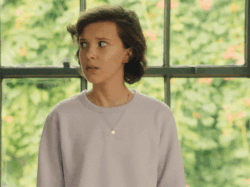 Should you read 'BUtterfield 8'? I had to sleep on it. When I woke, I concluded it's worth reading for its beautiful writing, and context and criticism of racial, class and gender issues we're still grappling with today.
Should you read 'BUtterfield 8'? I had to sleep on it. When I woke, I concluded it's worth reading for its beautiful writing, and context and criticism of racial, class and gender issues we're still grappling with today.
My rating:
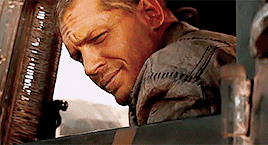 ** If you enjoyed this newsletter, please share Books on GIF with a friend. **
** If you enjoyed this newsletter, please share Books on GIF with a friend. **
Next Sunday, and the Sundays after that: I'm currently reading 'Pachinko' by Min Jin Lee and hope to have it finished by next week. Also in the queue are 'Swing Time' by Zadie Smith and 'The Good Earth' by Pearl S. Buck. Got a bestseller, a classic or a forgotten gem you want me to review? Shoot me an email.
If you missed last week's edition, here's my review of 'Transit' by Rachel Cusk.
Want to discuss further this or any other book? Hit me up on Twitter, Facebook, Instagram and Goodreads.
Thanks for reading, and thanks especially to Donna for editing this review!
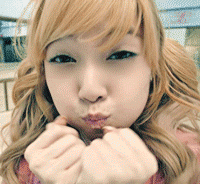 MPV
MPV











